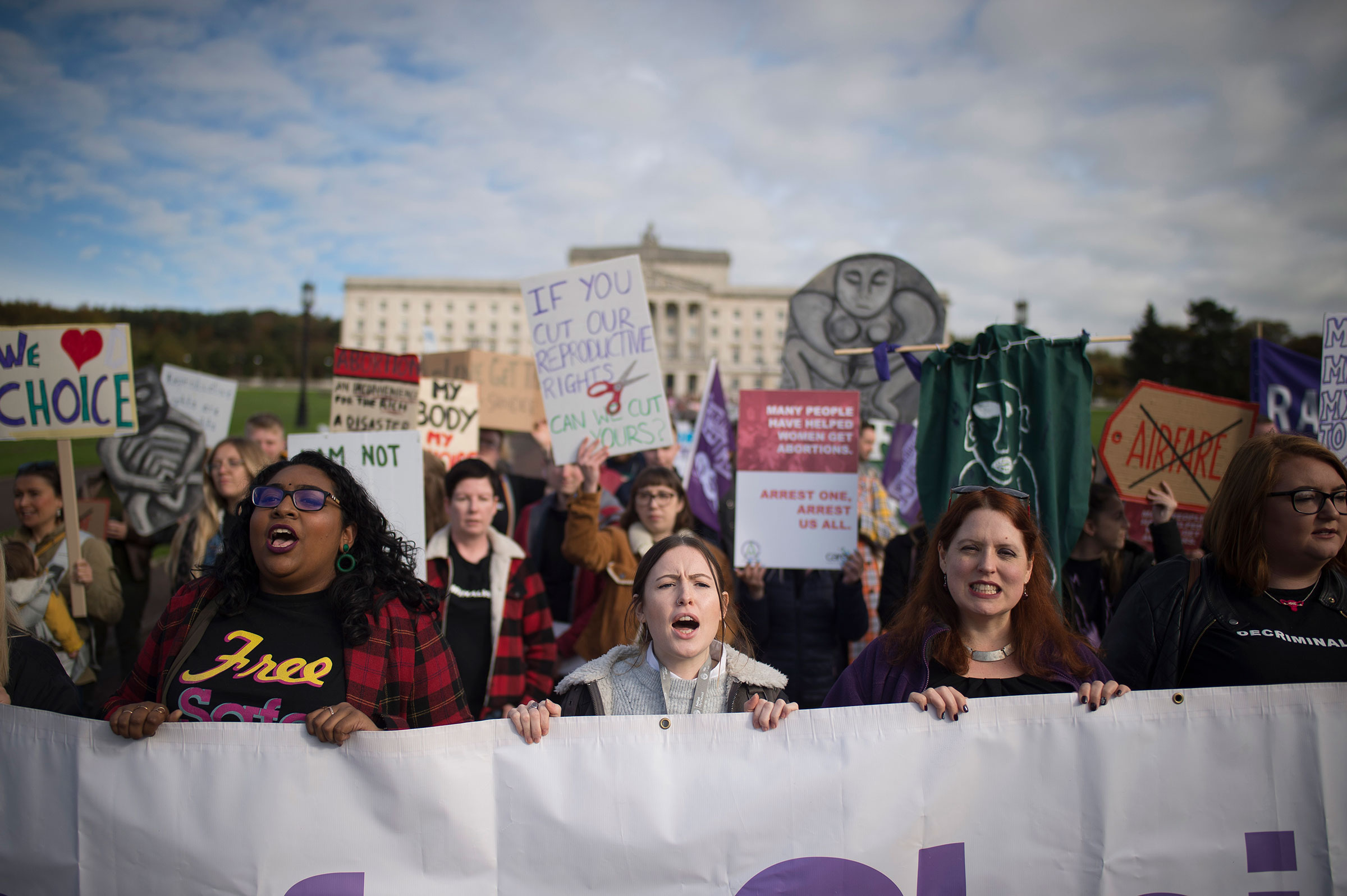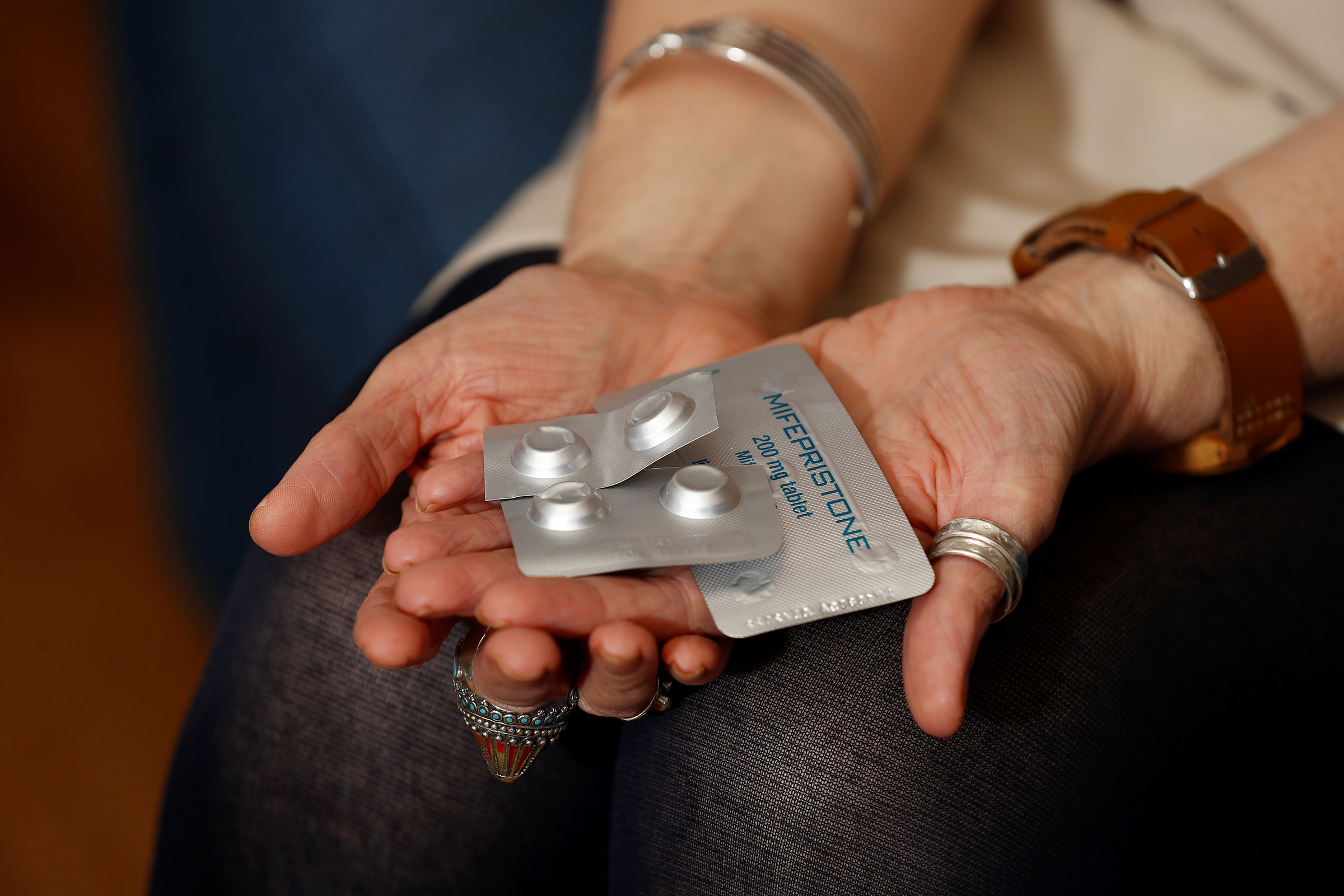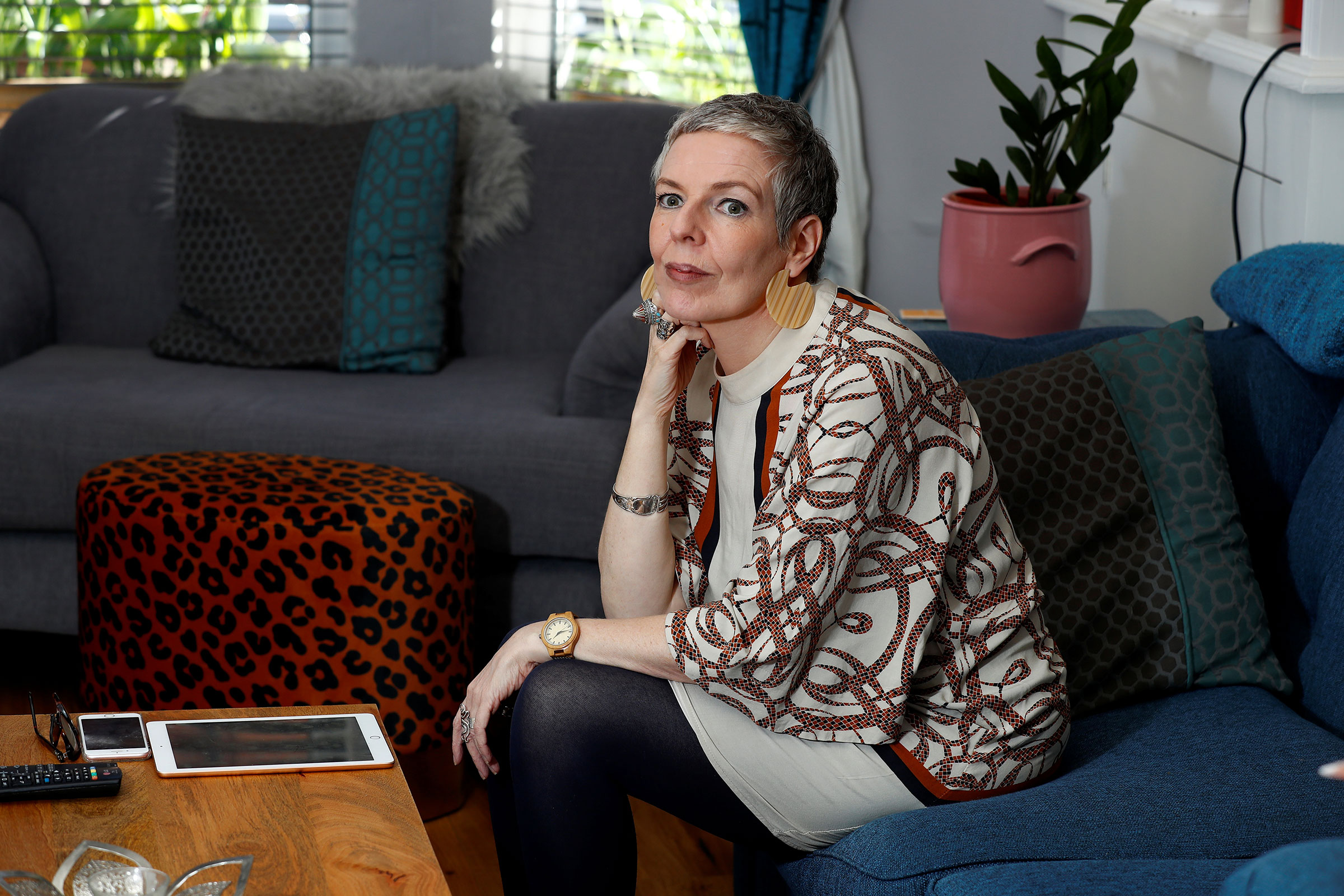
When Katie Boyd decided to have an abortion in November, she thought the process would be smooth. She had celebrated when abortion was decriminalized in Northern Ireland two years earlier, in October 2019, and two years on, it seemed logical that abortion care would now be readily available.
Boyd, 40, called a hotline intended to connect those seeking abortion with care, and was told she’d receive a call within five days from a clinic that could provide an early medication abortion. But five days went by with no call. Her follow-up calls begging for direct contact information for the clinic got her nowhere. As the days turned into weeks, Boyd began to panic. Medication abortion, which involves taking two sets of pills, is offered in Northern Ireland until the 10th week of pregnancy, a cutoff that was swiftly approaching. After that, she would have no choice but to travel to England, where abortion is more widely available. In desperation, Boyd contacted the international organization that mailed her abortion pills a few years earlier, when it was still criminalized. But instead of helping, the group directed her to call the same hotline because abortion was now legal in Northern Ireland. Legal—but not accessible.
“I was just hitting brick wall after brick wall after brick wall,” says Boyd. “And I got really upset.” She says she told her partner, “I feel like I’m in the 19th century. Something is happening to my body, and I’m not ok with it, and I feel like nobody’s listening to me.”
With little time to spare, Boyd emailed Alliance for Choice, an abortion-rights activist group in Belfast. Co-convener Naomi Connor replied within an hour, and soon helped Boyd access abortion pills through a different activist group, which she took at home to end her pregnancy. The entire process was “brutal,” she says—and far more difficult than the abortion she had several years earlier, when it was still criminalized. “It was more compassionate, and more empathetic, and I had more autonomy over my body when the service was illegal.”

While many in the U.K. are outraged at the rollback of abortion rights in the U.S. with the Supreme Court overturning Roe v. Wade, there are still significant barriers to abortion access in Northern Ireland, a part of the U.K. that is home to nearly 2 million people. Many are frustrated that there has been little progress more than two years after decriminalization. That’s because the Department of Health has not commissioned abortion services, leaving already-stretched health care workers to provide care on an ad-hoc basis without funding or training. The result is that those seeking abortion must navigate a maze criss-crossed with barriers. In the absence of government action, activists like Connor, who had hoped there would be less demand for their work after decriminalization, are busier than ever helping people access abortion.
Read More: The Failure of the Feminist Industrial Complex
The U.K. government has delegated many powers to Northern Ireland to allow local representatives to make decisions about how it is governed, including on abortion policy. But now, the U.K. government is poised to bypass Northern Ireland’s officials to set up abortion services directly because of frustration over the delay. In May, the U.K.’s Secretary of State for Northern Ireland, Brandon Lewis, directed the Northern Ireland Department of Health to establish fully-funded abortion services “within days to weeks.” If it does not, “I will intervene further,” he said in a written statement to parliament.
It wouldn’t be the first time Westminster intervened in Northern Ireland to secure abortion rights. Though abortion was legalized in the rest of the U.K. in 1967, that legislation did not extend to Northern Ireland, where it was prohibited in almost all circumstances. For decades, most people needing abortion were forced to travel to England or obtain illegal pills—or continue their pregnancies. In 2018 an inquiry by the United Nations Committee on the Elimination of Discrimination Against Women found that the U.K. was breaching the rights of women by restricting their access to abortion. The same year the U.K.’s Supreme Court said the restrictions in Northern Ireland were incompatible with human rights legislation. And after years of campaigning by Northern Ireland activists and civic groups, Westminster finally acted in 2019.
There was no referendum, as with the 2018 vote in the Republic of Ireland that led to the limited legalization of abortion, nor did it come through a court ruling. Instead, with Northern Ireland’s legislative assembly suspended due to political deadlock, the U.K. parliament passed a bill to maintain public services in Northern Ireland, and Labour MP Stella Creasy proposed an amendment decriminalizing abortion in Northern Ireland. When the bill came into effect in October, abortion was no longer criminalized, despite the protests of some Northern Ireland politicians. On paper, abortion law in Northern Ireland is now more permissive than the rest of the U.K., where a law criminalizing abortion is still on the books, though it was legalized in certain circumstances by the 1967 law. On the ground, as Boyd discovered, is a different matter.
Read More: How One of Ireland’s Leading Abortion Rights Activists Sees the Future of Roe
The U.K. government issued regulations outlining the new legal framework for abortion services in Northern Ireland in March 2020: It is available until 12 weeks for any reason, and until 24 weeks if two medical professionals certify that continuing the pregnancy would be a greater risk to the physical or mental health of the pregnant person than termination. After 24 weeks, abortion is permitted in cases of severe fetal defects and when the pregnancy risks death or serious permanent physical or mental harm to the pregnant person.
But Health Minister Robin Swann, of the Ulster Unionist Party, declined to set up and fund abortion care. (Northern Ireland has a publicly-funded universal health care system.) Swann maintains he needs approval from the Northern Ireland executive committee, which is not functioning due to an unrelated political dispute. In May, Lewis introduced regulations eliminating the need for executive approval to commission abortion services. A spokesperson for the Department of Health said the Minister is “currently awaiting legal advice on the implications” of the regulations “before considering the next steps regarding the commissioning of services.”
With no government action, clinicians are offering what care they can on top of their regular duties, without resources or direction. Four of Northern Ireland’s five local health care authorities are now offering medication abortions. Unlike the rest of the U.K., where telemedicine can be used to dispense the pills to people at home, those accessing a medication abortion in Northern Ireland must travel to a clinic to take the first pill. Though doctors have performed some surgical abortions since 2020, Connor says doctors recently stopped offering them because of the lack of support from the Health Department, so those who cannot or do not want to take the pills, or who cannot access them by the 10-week limit, must travel to England. That was particularly difficult during the COVID-19 lockdown in 2020, when most modes of transportation and hotels were shut down, and people were told to stay at home. According to figures released by the government on June 21, 161 women from Northern Ireland traveled to England and Wales for abortions in 2021, down from 371 in 2020.
In some areas abortion services have been suspended, leaving people without local access. The Western Health and Social Care Trust, which covers a large, mostly rural area, stopped offering medication abortion in April 2021 due to “staff resourcing issues,” said a Trust spokesperson. For a year, until neighboring trusts began to accepting referrals for Western Trust patients, they had no options but to to travel to England or order abortion pills online. The Trust is working to restart services “within the next number of months” and has recruited additional staff to “support the service going forward,” said the spokesperson.
Activists say clinicians are doing the best they can in the face of tremendous challenges. “The doctors and the healthcare professionals are operating in a vacuum,” says Connor. “There’s no governance for them, there’s no resources for them, there’s no funding for them. And the circumstances under which they were having to provide that abortion healthcare service was precarious for them. So we can’t blame them” when they are not able to provide the care.
In the information void left by the health department’s inaction, many people don’t know where to go to access abortion or even whether it is legal. Even the phone number people from across Northern Ireland call to access an abortion referral—the number Boyd called—is run not by the health department but by a non-profit abortion provider in England, which stepped in back in October after Northern Ireland sexual health charity Informing Choices NI was forced to end the service for lack of funding. Some women and pregnant people who turn to Google for information end up at anti-abortion pregnancy centers, which sometimes use delaying tactics until people are past the 10-week limit for medication abortion, says Connor.
To find the care they need, many are turning to activists. Connor receives daily requests for help. On a recent afternoon in Belfast, she stopped twice mid-conversation to take calls or messages from women seeking help accessing abortion. She got involved in the work after she was forced to travel to England to access abortion a decade ago. It took years to “unpack the stigma,” she says. Now, she tries to help others avoid the same experience.

When Connor initially spoke to Boyd and assured her she could help, “I felt like I exhaled for the first time in weeks,” says Boyd. Like 57% of women who had an abortion in the U.K. last year, Boyd is already a mother. (In the U.S., about 60% of women who have an abortion already have at least one child.) She and her partner of seven years are careful about using contraception, so she was shocked when she realized she was pregnant in November. Her partner, who is on a waiting list for a vasectomy, supported her decision to seek an abortion. (Waiting times for access to long-acting contraception is a connected issue—the Western Trust, where there are no abortion services, has a 16-week waiting list for patients seeking contraceptive coils and implants.) About a month after she first called the referral hotline, Boyd finally received a call from the clinic in Belfast. By that point, she says, she had already completed her self-managed abortion. But she did need to seek medical help because of continued bleeding. At the hospital, doctors removed tissue that hadn’t been expelled in the abortion.
Like Boyd, many struggle to access abortion within the 10-week limit for abortion pills. The earliest a pregnancy can be detected is at four weeks, and many learn they are pregnant later, putting them close to the limit. Waiting even a week for a referral to a clinic can put people over the cutoff. And that’s if they can get to a clinic in the first place. For some in abusive or coercive relationships, it is impossible. Some people are unable to take off work, find childcare, or arrange transportation, a particular concern in rural areas like much of the Western Trust. Traveling to England is even more difficult.
Read More: The State of Abortion Rights Around the World
One of the women Connor helped recently was a refugee who had endured female genital cutting, rape, and trafficking. She spoke little English, was diabetic, and was afraid to talk to her doctor. When Connor helped her access a clinic, a translator refused to participate after learning the woman needed abortion care. Clinicians determined she was over 10 weeks pregnant, which meant she would have to travel to England. Connor was furious. “This woman had encountered all that, she got to a place of safety here in Northern Ireland. And we were going to tell her she had to travel?”
Connor asked the doctor to call a local hospital, where doctors agree to perform a surgical abortion. The woman spent three days in the maternity unit’s labor and delivery suites, and eventually had a surgical abortion after multiple failed attempts at medication abortion. She was put in a room designed for miscarriages and stillbirths, and because of protocol she had to sign forms, and doctors had to give her pamphlets, meant for miscarriage. The setting and protocol, a result of the lack of commissioning of abortion care, were described by the clinicians as grossly inappropriate, says Connor, and they apologized to her and to the woman repeatedly, though she says they did the best they could. She recently had to tell another woman that she would have to travel for an abortion, though the woman already told her she cannot, because local doctors declined to perform a surgical abortion because of the lack of commissioning. “Those women who should be traveling the least, they’re the people who are being forced to travel,” she says. “And it’s inhumane.”
The need for assistance is so great that in 2020 Alliance for Choice organized an “abortion doula” training, where participants learned about abortion and how to support people through the process. Connor stresses that they are not healthcare professionals or counselors, and they do not interfere with people’s decisions. But once someone makes a decision, “we are there to support people throughout their abortion journey, whether that be practical, emotional, logistical, or any other type of support that we can realistically provide.”
For Bethany Moore, who participated in the training and now serves as an abortion doula with Alliance for Choice Derry, a separate organization, that can look like helping with childcare, dropping off a meal, helping navigate the care, or even just providing a listening ear. “It’s a radical act of community care, a radical act of love, helping someone get the care they need,” she says.
Often, activists are the only people those seeking help feel safe confiding in. Claire Hackett, an abortion doula with Alliance for Choice who lives in a rural area, says many of the women who come to her for help accessing abortion don’t feel comfortable sharing their situation with anyone else because of the stigma. When she talks with them, “they’re just so relieved to be able to unburden,” she says. When she tells them “look, we will get you sorted, you’re not on your own—you can really hear the relief and the relaxation in them.”
About one in three women in the U.K. will have an abortion by the time they are 45, but the stigma isolates people and hampers access. Protesters often gather outside clinics. Northern Ireland is a small, tightly knit society, and many fear being recognized when going to a clinic, or even talking to their doctor. “Your doctor might be a family friend,” says Moore. “There is that worry of who’s going to see me, what is my doctor going to say.”
Attitudes toward abortion are changing in Northern Ireland. Public opinion surveys show that the majority support decriminalization and access to abortion. But stigma is still “prevalent and multi-layered,” says Fiona Bloomer, a senior lecturer at Ulster University who studies abortion. “We’re not a society that is used to talking about sex, relationships, and sexual health. So abortion is on the far end of that scale,” she says. That silence allows the stigma to persist. “As a society we’re on a pathway of feeling more relaxed about talking about abortion, but there’s a long way to go.”
Activists know the stigma means that there will be work to do even if abortion services are commissioned tomorrow. But that’s the first step, and they say it must happen now. ”It’s beyond a joke that we still have no abortion services,” says Moore. “And that really comes from a lack of political will from the Health Minister to put his personal feelings aside and do his job.”
Correction, June 30
The original version of this story misstated the political party Health Minister Robin Swann belongs to. He is from the Ulster Unionist Party, not the Democratic Unionist Party.
More Must-Reads from TIME
- How Donald Trump Won
- The Best Inventions of 2024
- Why Sleep Is the Key to Living Longer
- Robert Zemeckis Just Wants to Move You
- How to Break 8 Toxic Communication Habits
- Nicola Coughlan Bet on Herself—And Won
- Why Vinegar Is So Good for You
- Meet TIME's Newest Class of Next Generation Leaders
Contact us at letters@time.com